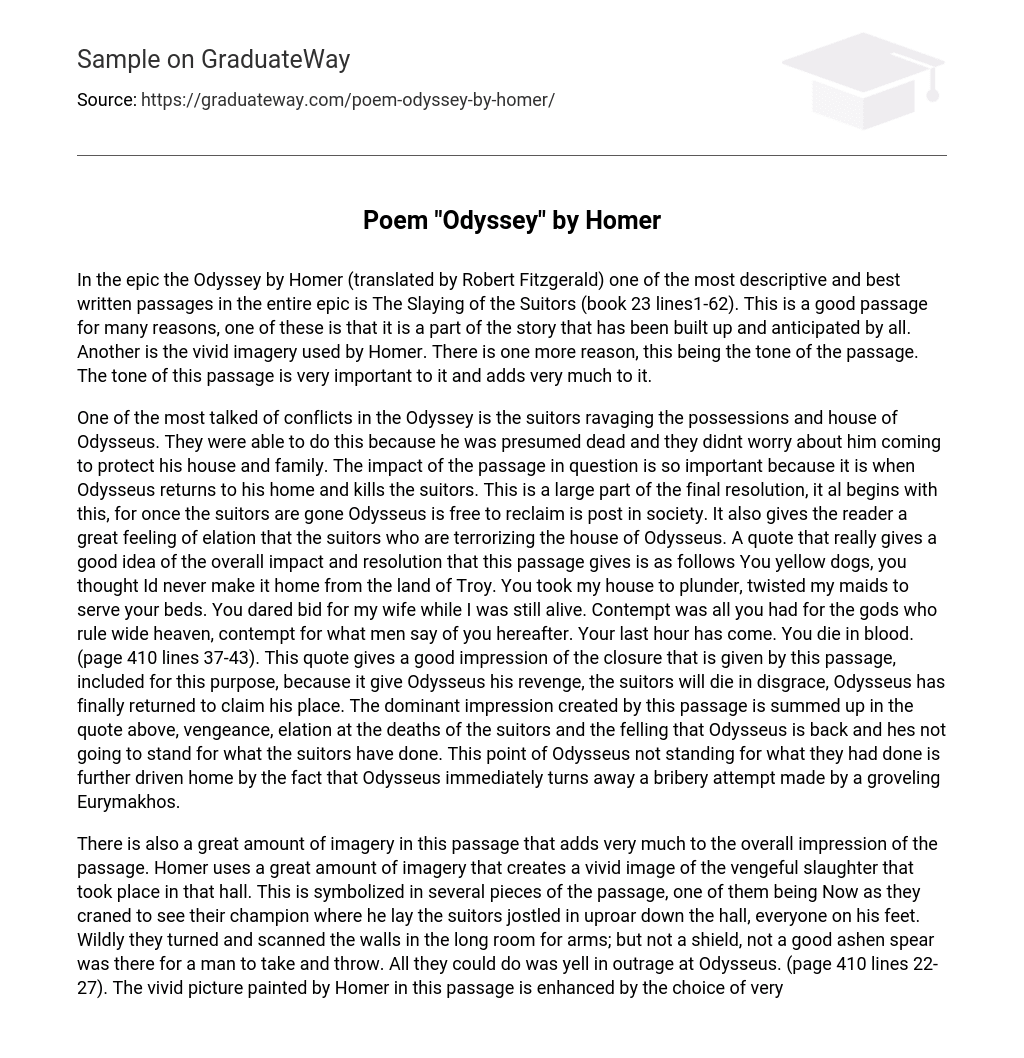One of the most anticipated and impactful passages in The Odyssey by Homer, as translated by Robert Fitzgerald, is The Slaying of the Suitors (book 23 lines 1-62). This passage, which has been built up throughout the story, showcases Homer’s descriptive and well-written style. Through vivid imagery and a carefully crafted tone, Homer enhances the narrative.
While Odysseus was believed to be dead, the suitors took advantage of his absence to pillage his possessions and home. However, this passage portrays the crucial moment when Odysseus returns and slays the suitors, marking the ultimate resolution of the conflict. With their demise, Odysseus can now reclaim his rightful place in society. This passage also creates a strong sense of joy for readers as the suitors, who have been tormenting Odysseus’ household, meet their just fate. A quote that effectively captures this impactful and conclusive moment states: “You yellow dogs, you thought I’d never make it home from the land of Troy. You took my house to plunder, twisted my maids to serve your beds. You dared bid for my wife while I was still alive. Contempt was all you had for the gods who rule wide heaven, contempt for what men say of you hereafter. Your last hour has come. You die in blood” (page 410 lines 37-43). This quote exemplifies how this passage brings closure as Odysseus seeks revenge and delivers a disgraceful end to the suitors while finally returning to claim his rightful position.
This passage conveys an intense impression regarding vengeance and elation by highlighting Odysseus’ return and unwavering determination not to tolerate the actions of the suitors. The mention of Odysseus rejecting a bribe from Eurymakhos further reinforces this sentiment.
The passage contains a significant amount of imagery that greatly contributes to its overall impact. Homer employs vivid descriptions to create a clear picture of the vengeful massacre that occurred in the hall. This is exemplified in multiple parts of the passage, such as when the suitors, with great commotion, turned their heads to see their fallen champion. Frantically, they searched the walls of the long room for weapons but found none. They could only express their outrage at Odysseus through loud shouts (page 410 lines 22-27). Homer’s use of descriptive words and phrases further enhances the vivid imagery. For instance, the depiction of the suitors craning their necks to see their fallen comrade and causing chaos in the room paints a clear picture that requires little effort to visualize. Another quote provides an even clearer image for the reader, particularly with lines like “sickly fear pulled at their entrails” and “their eyes flickered” as they nervously sought refuge from death (page 410 lines 44-46). These phrases create high-quality mental images for the reader.The suitors are depicted as being in a state of panic and desperation, desperately scanning the room for a safe haven from the unexpected force that has returned to them. The language used to describe the start of the battle evokes shock, amazement, and mortal fear. The overall tone of this passage is very serious, with multiple aspects. One prominent tone is that of vengeance, as reflected in the quote “Your clean-cut game is over.” Odysseus exudes this tone throughout the passage, appearing pleased to finally resolve the family’s troubles caused by his absence. Another tone present is that of fear and shock, primarily experienced by the suitors who now find themselves facing their worst nightmare. This is demonstrated in the quote “As they took all this in, sickly green fear pulled at their entrails, and their eyes flickered looking for some hatch or hideaway from death.” Only Eurymakhos was able to find his voice among them.The suitors are rendered speechless and terrified, with the exception of Eurymakhos, as they frantically search for a place to hide. This sense of urgency intensifies the selection. The tone of the passage derives from the characters’ attitudes and emotions, which include shock, fear, urgency from the suitors, and revenge from Odysseus. These tones bring the passage to life, enhancing its impact significantly. Consequently, a sense of elation arises as the suitors meet their ultimate demise, contributing to the urgency conveyed in this passage.
In this passage, Homer effectively uses tone and imagery to enhance the reader’s understanding. The tone is crucial for conveying the intended effect on the story and setting up a climactic ending. It also prepares both the reader and Odysseus for what is to come. Furthermore, the passage symbolizes Odysseus’ return home, his victory over his enemies, and the conclusion of his arduous journey. The use of imagery by Homer effectively portrays the magnitude of these important events.





